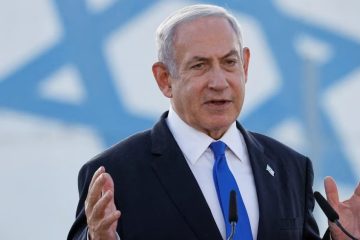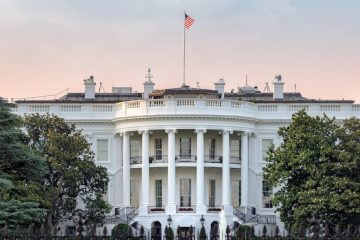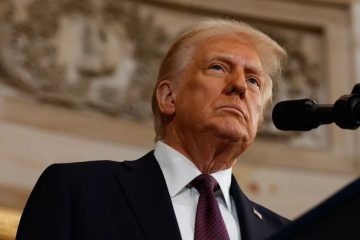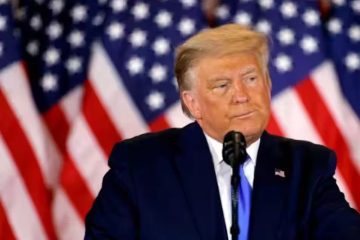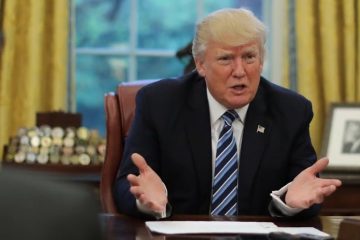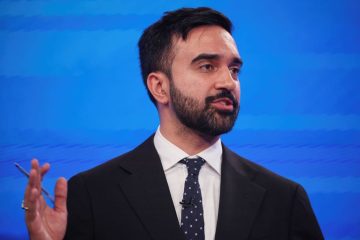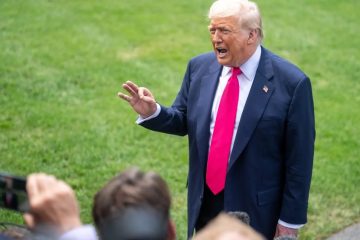U.S. and Canada clash after 150 years of friendship
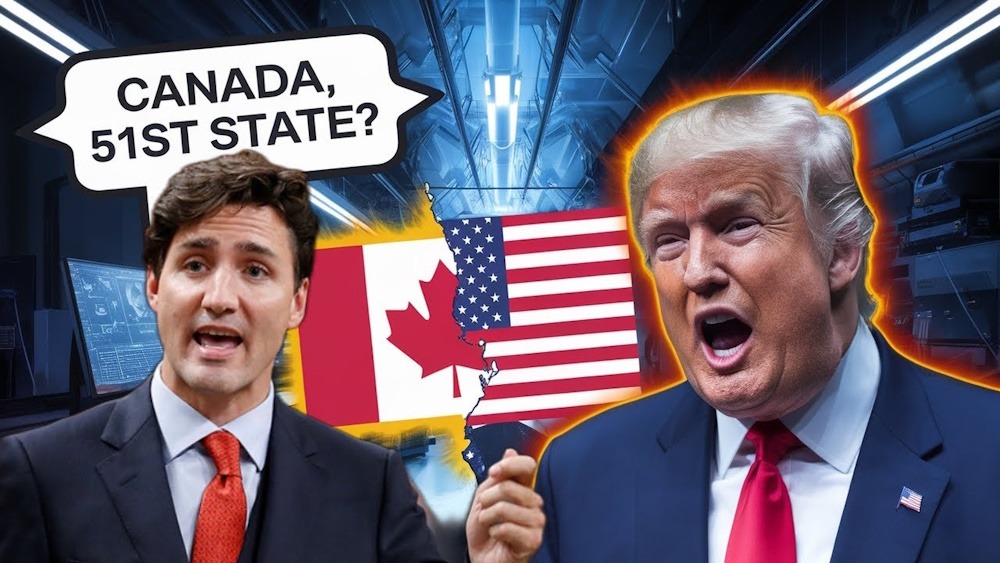
During his initial term, Canadian officials regarded President Trump’s musings about annexing Canada in private discussions with Prime Minister Justin Trudeau as mere jest. A dramatic hockey confrontation between the two nations underscored Canada’s earnest approach to the perceived threat. The notion of transforming Canada into “the 51st” state has emerged as one of Trump’s most enduring, albeit seemingly implausible, themes at the outset of his second presidential term. He advocates for the elimination of what he describes as the “artificial line” separating the two nations. He has indicated a willingness to employ “economic force,” such as tariffs, to persuade Canada to align with the United States. In a conversation earlier this month, he informed Trudeau that he could eliminate the border by abrogating a 1908 treaty between Great Britain and the United States, which established the 49th parallel as the boundary, according to sources familiar with the discussion. He has begun to address Trudeau as “governor.”
Canadian leaders express their discontent. Trudeau called an emergency economic summit with business and labor leaders, urging them to reduce their reliance on the U.S. and to emphasize to their American counterparts that both economies would endure adverse effects in the event of a protracted conflict. He traveled to Europe to garner support from allies, arguing that if Canada is not secure from Trump’s threats, then no nation is safe. Then the gloves were unequivocally removed. During an international tournament in Montreal last weekend, the American national anthem was met with a chorus of boos from the exuberant Canadian fans as the U.S. faced off against Canada. As the puck was dropped to commence the match, a significant altercation erupted on the ice, leading to an influx of players into the penalty boxes.
“If there was any uncertainty regarding the escalating bitterness of this rivalry, it has now been unequivocally addressed,” remarked Chris Cuthbert, an announcer for Canada’s Sportsnet channel. As the emotionally charged rematch for the tournament title approaches on Thursday in Boston, Trump took to Truth Social to extend his best wishes to the American team while simultaneously taunting the Canadian prime minister. He invited the latter to join U.S. governors in Washington, D.C., to watch the game on television. Following Canada’s 3-2 victory, Trudeau took to X to deliver a final remark, at least for the moment: “Our nation is not yours to claim—and neither is our sport.”
The recent developments mark a remarkable shift for two countries that have historically coexisted along the globe’s longest unfortified frontier. They constitute significant trading partners, collaborate in military endeavors, and are bound by mutual security agreements. Automobile manufacturing facilities across the border collaborate on components, production processes, and workforce utilization. Canadians frequently choose Florida as a vacation destination and invest in real estate in Arizona. Americans express appreciation for Ryan Gosling, Joni Mitchell, and Canada Goose parkas. Teams from Canada and the United States are united under a single National Hockey League. Brady Tkachuk, an American player involved in the on-ice altercation with Canadians on Saturday night, typically represents the Ottawa Senators.
The dynamics of the relationship may be irrevocably altered. “We find ourselves grappling with a reality where the United States poses a significant threat to Canada’s sovereignty,” remarked Gerald Butts, vice chairman of the Eurasia Group consulting firm and a former senior adviser to Trudeau. Butts noted that Trump referenced the notion of a 51st state on several occasions during his initial term, albeit always in private settings.
Trump’s confrontational rhetoric and conduct have caught numerous Canadians off guard. However, the concerns that the president expresses regarding Canada—such as trade disagreements, border security, and defense matters—have historically been the root of enduring tensions between the two nations, according to former diplomats and business leaders. There is no evidence to suggest that Trump intends to deploy tanks to the north, nor is Canada positioning military personnel along its border. Officials in Ottawa are preparing for a potentially protracted campaign, anticipating that the U.S. may employ economic leverage to compel Canada to acquiesce to Trump’s demands.
Canadian leaders have signaled the potential for retaliatory tariffs, concurrently engaging in diplomatic efforts by journeying south to confer with governors, legislators, and CEOs. Earlier this month, the 13 leaders of Canada’s provinces and territories convened in Washington to engage with members of Congress, alongside James Blair, the deputy chief of staff for legislative, political, and public affairs, and Sergio Gor, the director of personnel. The Canadian premiers reported that the discussions were productive. However, following the conclusion of the event, Blair remarked, “To clarify, we never consented to the notion that Canada would not become the 51st state.” Ontario Premier Doug Ford donned a “Canada is not for sale” hat, which has emerged as one of this winter’s most sought-after accessories.
Trump’s threats have introduced a degree of volatility and discord into what has long been regarded as one of the most stable and influential partnerships globally. They have also sparked a fervently nationalistic response that is distinctly uncharacteristic of Canadian sensibilities. Liquor retailers in Ontario, Quebec, and British Columbia have opted to boycott American spirits. This winter, a blue baseball cap emblazoned with the phrase “Canada is Not for Sale” has emerged as a highly sought-after fashion accessory.
Drew Dilkens, the mayor of Windsor, Ontario, situated just across the river from Detroit, announced his intention to withdraw the city’s sponsorship of the Detroit Grand Prix once tariffs are implemented. Earlier this month, he also terminated a bus service that facilitates the transit of 40,000 Canadians into Detroit annually. He asserted that those actions constitute retribution in response to President Trump’s threats. “It is imperative that we convey a message in return,” stated Dilkens. “Do you anticipate that I will simply acquiesce to this?” Absolutely not!
Trudeau has urged Americans to recall that Canadian soldiers fought alongside them in France, the Korean Peninsula, and Afghanistan. “We find ourselves in this position against our will, yet we remain resolute,” Trudeau stated in a nationally broadcast address on February 1, coinciding with Trump’s announcement of sweeping tariffs on Canada and Mexico. “It was a defining moment,” remarked Lana Payne, president of Unifor, a private-sector union representing 320,000 automotive and other workers throughout Canada. Accompanied by her husband and their 23-year-old daughter, she observed the speech in Toronto, keen to assess Canada’s response to what she termed a “unprovoked attack on Canada’s economy and its workers.” Regardless of whether Trump enacts comprehensive tariffs, the discourse of the preceding month is prompting Canada to reassess its reliance on the largest economy globally, which accounts for over 75% of its goods exports. “At this juncture, there is no possibility of retreat,” Payne stated.
The threats have already manifested in tangible consequences. South Shore Furniture, a Quebec-based manufacturer, announced the layoff of 115 employees in February, attributing the decision to the looming threat of tariffs. South Shore derives 70% of its revenue from the United States; however, the Trump administration’s persistent threats prompted the company’s buyers to increasingly source from Asian markets, adversely impacting business, according to the company. The chief executive of Canadian airline WestJet reported a 25% decline in the number of Canadians making travel arrangements to the U.S. during the initial weeks of February.
Trump initiated his critique by targeting Canada for purportedly not doing enough to stop fentanyl and unauthorized immigrants from crossing into the U.S., but his remarks have since intensified. He asserts that the annual financial support provided by the U.S. to Canada reaches $200 billion, factoring in a goods trade deficit of $63 billion in 2024, alongside the contributions made by the U.S. towards the joint defense of both nations, particularly in the Arctic region. Canada, a founding member of NATO, fails to achieve the alliance’s target of allocating at least 2% of its GDP to defense, a shortfall that has persistently vexed the president.
On Super Bowl Sunday, Trump asserted that Canada had appropriated its automotive sector from the United States, warning of potential retaliatory tariffs on Canadian-manufactured vehicles, a significant number of which are marketed in the U.S. He asserted that Canada would falter should the U.S. withdraw its defense support and impose tariffs on automobiles. “If we proceed in that manner, their viability as a nation is compromised,” Trump remarked aboard Air Force One. “It is indeed frustrating,” remarked David MacNaughton, the former Canadian ambassador to the U.S., who played a pivotal role in negotiating the U.S.-Mexico-Canada trade agreement, USMCA, during Trump’s initial term. What are their objectives? This situation has incited considerable frustration among Canadians.
At a recent book launch in Ottawa, Stephen Harper, the former prime minister of Canada with a conservative inclination, asserted that he would be willing to endure “any level of damage” to maintain the nation’s independence. “I would be willing to impoverish the country rather than face annexation, if that is the choice before us,” stated Harper, as reported by those present during his comments. Some Americans find themselves perplexed by a verbal conflict with a neighbor traditionally perceived as relentlessly amiable and cheerful—America’s very own Ned Flanders. “You have a nation with which you share a close camaraderie, or at least a solid rapport.” All matters have proceeded smoothly. What prompts such statements from you? inquired Heidi Alford, a librarian based in Shelby, Montana, close to the Canadian border. The reports of Canadians expressing discontent during the U.S. national anthem raised significant concerns for her. “I hope it doesn’t alienate the public, but I cannot be certain,” she remarked regarding Trump’s threats. “It appears that there may be some lingering animosities.”
According to Jonathan Wilkinson, Canada’s Minister of Energy and Natural Resources, the strong connections have rendered Trump’s threats particularly damaging. He expressed approval when several provincial leaders mandated the removal of American wine and whiskey from local liquor store inventories. The relationship, he apprehensively notes, has sustained significant damage. “It represents a profound disruption to the collective consciousness,” remarked Wilkinson. “It will leave lingering doubts in the public’s mind regarding the long-term reliability of the U.S.” Justin Burkey, an employee of the Nova Scotia Liquor Corporation, systematically removes U.S.-produced wine from the shelves. Liquor retailers in Ontario, Quebec, and British Columbia have opted to boycott American spirits.
Canada and the United States have navigated previous disagreements with resilience. The imposition of import tariffs by the U.S. under the 1930 Smoot-Hawley Tariff Act aimed at safeguarding American farmers prompted Canada to respond with increased tariffs on various goods, including eggs. This retaliatory measure led to a significant decline in U.S. egg exports, as noted by Douglas Irwin, an economics professor at Dartmouth College. The alliance strengthened as the partners collaborated in the theater of World War II, subsequently solidifying with a 1965 agreement that eliminated the majority of tariffs on automotive commerce. In 1980, tensions escalated as irate residents of Maine erected barricades at the border using heaps of decaying potatoes, protesting against the influx of less expensive Canadian produce that threatened their livelihoods. The nations entered into their inaugural comprehensive free-trade agreement in 1988, subsequently broadening its scope to encompass Mexico and rebranding it as Nafta. In his initial term, Trump compelled a reworking of the agreement, resulting in the USMCA.
A segment of the Canadian populace perceives this juncture as a crucial alert. Jim Balsillie, the former chairman and co-CEO of Research In Motion, maker of the BlackBerry mobile phone, asserted that Canada’s leaders have complacently relied on American generosity for an extended period and have failed to adjust to a transforming global landscape. “They maintained simplistic and emotional perspectives as the global economic landscape underwent fundamental transformations right before their eyes over the past twenty years,” he stated.
Critics argue that Canada has exposed itself to the risks posed by an assertive president by failing to address longstanding grievances between the two nations. In the 1960s, the two nations strengthened their ties as Prime Minister Lester Pearson and President Lyndon Johnson reached an agreement, formalized during a weekend retreat at Johnson’s Texas ranch, which eliminated the majority of tariffs on automotive trade.In 1980, potato farmers in Maine staged a blockade at the border, using heaps of decaying potatoes to voice their discontent over the influx of less expensive Canadian imports that threatened their livelihoods.
“There are pressing matters that require attention and they merit resolution,” stated David Cohen, who served as the U.S. ambassador to Canada during the Biden administration. He scrutinized Trump’s strategies, yet acknowledged that numerous presidents have raised concerns regarding Canada’s policies on defense, border enforcement, softwood lumber trade, and market access for U.S. dairy farmers.
The leader of the chamber of commerce in the vicinity of Plattsburgh, NY, expresses satisfaction with the current state of affairs in the relationship. This rural region of upstate New York has strategically positioned itself as a suburban extension of Montreal, fostering cross-border investment and research collaborations that have enabled the Plattsburgh area to thrive, according to Garry Douglas, president of the multicounty North Country Chamber of Commerce. “In numerous respects, we have positioned ourselves as an economic adjunct to the Quebec economy,” he stated.
In the Plattsburgh region, Canadian manufacturers provide employment for hundreds, producing plastics, aerospace components, and various other goods, he noted. In Plattsburgh, accountants and lawyers are experiencing a surge in demand as they provide essential services to Canadian firms seeking to invest in the United States. New York state relies heavily on Canada for a significant portion of its electricity, natural gas, cement, and gasoline supplies. “The U.S. and Canada have evolved into a post-trade relationship characterized by significant integration, focusing on collaborative production rather than merely the valuation of goods exchanged,” Douglas stated.
Brian Guerrette, a potato farmer located in Caribou, Maine, approximately twelve miles from the Canadian border, remarked that he has not encountered significant discourse regarding the influx of fentanyl from Canada. According to Guerrette, moose present a more significant challenge, compounded by an oversupply of inexpensive Canadian potatoes. The prospect of Trump’s advocacy for a 51st state has caused unease among some of Guerrette’s Canadian acquaintances just across the border. “Certain individuals believe this marks merely the onset of a takeover,” he remarked. “They perceive it as the onset of a period that will render their existence increasingly burdensome until they capitulate.”
The 53-year-old farmer expressed a willingness to accept tariffs or other import restrictions aimed at safeguarding the U.S. market. He believes it might be the moment for his northern acquaintances to make a decision. “They aspire to function akin to a state, promoting essentially unrestricted trade while maintaining their sovereignty,” he remarked. “Canada aspires to function with the attributes of a state while refraining from fully embracing statehood.”

